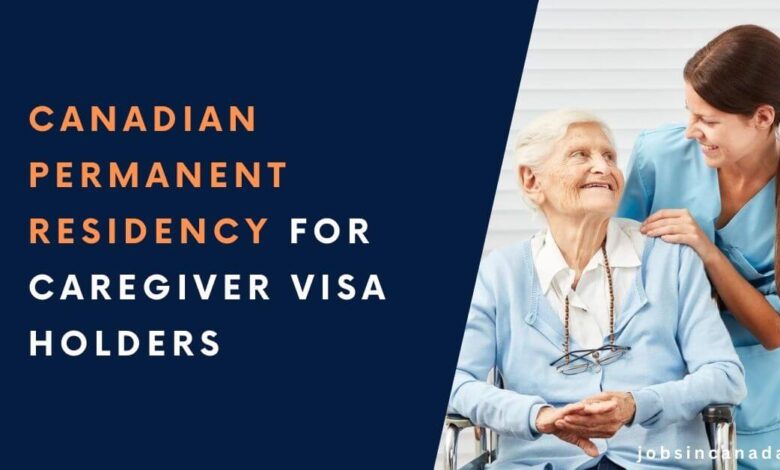Canadian Permanent Residency for Caregiver VISA Holders

The introduction of new pilot programs in Canada is transforming the process of obtaining permanent residency for caregivers. These programs represent a substantial departure from the previous requirements, which required caregivers to acquire work experience in Canada before applying for permanent residency. Currently, eligible caregivers can obtain permanent resident status upon their arrival in Canada, which simplifies the immigration process and offers increased autonomy and protection against abusive workplaces.
Check Also: Increase Qualification Chances for Canadian Open Work Permit
Canadian Permanent Residency for Caregiver VISA Holders Without Work Experience Requirement
The new pilot programs that Canada has implemented provide caregivers with a simplified procedure for obtaining permanent residency immediately upon their arrival in the country. The objective of this initiative is to address the growing need for caregivers in Canada as a result of the elderly population while also streamlining and humanizing the immigration process. The following are the benefits of this initiative:
- Permanent Residency Upon Arrival: Caregivers can now obtain permanent resident status upon their arrival in Canada, eliminating the necessity for prior Canadian work experience.
- Simplified Immigration Process: The programs are designed to simplify the bureaucratic process, thereby facilitating the settlement of caregivers in Canada.
- Workplace Abuse Protection: Caregivers will have greater flexibility to exit abusive work environments without compromising their immigration status with permanent residency.
Eligibility for Canadian Caregiver Permanent Residency Pilot Program
To be eligible for these new pilot programs, caregivers must satisfy specific qualifications:
- Language Proficiency: A minimum of level 4 in the Canadian Language Benchmarks (CLB).
- Education: A high school diploma or its equivalent.
- Work Experience: Relevant and recent work experience in the caregiving sector.
- Job Offer: A full-time position for home care labor in Canada.
These prerequisites guarantee that caregivers are adequately equipped to deliver exceptional care to individuals in need while seamlessly assimilating into Canadian society.
Average Caregiver Salaries by Province (Estimates)
The most recent average salary estimates for caregiver professions in each Canadian province are as follows:
| PROVINCE/TERRITORY IN CANADA | AVERAGE ANNUAL SALARY (CAD) |
|---|---|
| Alberta | $40,000 – $50,000 |
| British Columbia | $42,000 – $55,000 |
| Manitoba | $38,000 – $48,000 |
| New Brunswick | $35,000 – $45,000 |
| Newfoundland and Labrador | $35,000 – $45,000 |
| Northwest Territories | $45,000 – $60,000 |
| Nova Scotia | $35,000 – $45,000 |
| Nunavut | $50,000 – $65,000 |
| Ontario | $40,000 – $52,000 |
| Prince Edward Island | $35,000 – $45,000 |
| Quebec | $38,000 – $50,000 |
| Saskatchewan | $38,000 – $48,000 |
| Yukon | $45,000 – $60,000 |
List of Occupations Under Caregiver Status in Canada:
A variety of occupations are included in the category of caregiver roles, which are dedicated to assisting individuals with their daily living activities. The following are some of the most frequently encountered caregiver roles:
- Personal support worker (PSW): This individual is responsible for providing personal care and assistance.
- Home Health Aide (HHA): Provides personal care and minor housekeeping.
- Home Support Worker: Assists with personal care and domestic responsibilities.
- In-home caregiver: Offers continuous care.
- Nanny: Provides domestic assistance to minors.
- Developmental Support Worker: Assists individuals with developmental disabilities.
- Mental Health Worker: Provides support to individuals with mental health conditions.
- Community Support Worker: Assists individuals with disabilities or mental health conditions in utilizing community resources.
- Companion: Offers social support.
- Respite Worker: Primary caregivers are temporarily relieved by respite workers.
- Homemaker: Assists with domestic responsibilities.
Benefits of Caregiver VISA Holders:
- Pathway to Permanent Residency: Numerous countries, such as Canada, provide caregiver visa holders with the opportunity to file for permanent residency, thereby ensuring a stable and secure future for them and their families.
- Caregivers are in high demand in numerous: developed countries due to the aging populations and the escalating healthcare requirements. This has resulted in job security and a variety of opportunities across various regions.
- Family Sponsorship Opportunities: After satisfying specific residency requirements, certain caregiver visas, such as those in Canada, permit visa holders to either bring their family members with them or submit for family reunification.
- Skill Development and Training: Professional development opportunities, such as training in healthcare, eldercare, and other caregiving skills, are frequently available to caregivers. These opportunities can improve their qualifications and future career prospects.
- Competitive Salaries and Benefits: Numerous nations provide financial stability for caregiver positions by offering competitive wages, healthcare benefits, paid leave, and retirement contributions.
- Cultural Exchange and Personal Development: The opportunity to experience a new culture, enhance language abilities, and develop cross-cultural understanding is provided by working as a caregiver abroad, which enriches both personal and professional lives.
- Job Flexibility: Caregiver roles are versatile, providing caregivers with the opportunity to select roles that are to their preferences and abilities. These roles may be located in a variety of settings, including hospitals, assisted living facilities, or at home.
- In-Demand Certifications: Certification is frequently necessary for caregivers who work internationally. This certification can increase their employability and provide globally recognized credentials that can improve their future career prospects, even if they return to their home countries.
- Impactful Work: Caregiving is a profession that is personally rewarding and directly benefits others, enabling visa holders to make a significant impact on the lives of individuals.
Qualifications for Caregiver Professions Required in Canada:
The qualifications necessary for caregiver positions may differ.
- Education: Education frequently necessitates a high school diploma or pertinent certification (e.g., a PSW certificate).
- Experience: It is frequently necessary to have prior experience in caregiving.
- First Aid and CPR Certification: First aid and CPR certification are frequently required for the majority of positions.
- Susceptible Sector Check: Mandatory for employment with vulnerable populations.
- Language Proficiency: Proficient in the use of English or French to communicate effectively.
Caregivers Applying for Permanent Residency
According to this webpage, the application process for Canadian permanent residency through the new caregiver pilot program consists of several key steps:
- Job Offer: Obtain a job offer from a Canadian employer.
- Language Test: Achieve the necessary CLB level.
- Education Credential Assessment: Verify foreign students’ educational credentials.
- Application for a Work Permit: Apply for a work permit.
- Upon arrival in Canada, submit an application for permanent residency without work experience at the following link: https://prson-srpel.apps.cic.gc.ca/en/login.
Frequently Asked Questions:
-
Can I apply for PR as a caregiver in Canada?
You can come to Canada to become a permanent resident or work temporarily as a caregiver.
-
How long is the caregiver visa in Canada?
The employer must plan before hiring a caregiver, as the processing of this application can take up to 12 months. The work permit will be eligible for 3 years.
-
Can I relocate to Canada to be a caregiver?
Families seeking to hire foreign caregivers must initiate the process by submitting an LMIA application and obtaining approval. After that, the caregiver can then apply for a work permit through Immigration, Refugees, and Citizenship Canada (IRCC). This will allow them to legally work in Canada.




